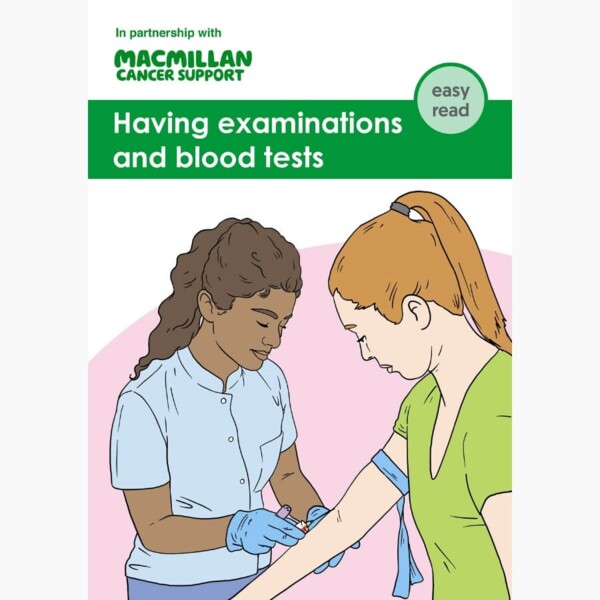Blood tests
There are many types of blood test. You may have a blood test to check your general health, help diagnose cancer or check how you are responding to treatment.
What is a blood test?
Blood tests can check for example:
- the number of white blood cells, red blood cells and platelets in the blood (full blood count)
- how well organs such as the liver and kidneys are working
- for abnormal levels of proteins called tumour markers
- the levels of other substances in the blood that may be linked to certain types of cancer.
Your doctor will explain which tests you need.
In the animation below we talk about how blood cells are made, the functions of white blood cells, red blood cells and platelets.
Booklets and resources
Having a blood test
You may have the blood test at your GP surgery or at a hospital outpatient clinic.
A doctor, nurse or someone trained to take blood (phlebotomist) collects the blood sample. It only takes a few minutes. They place a tight, stretchy band around your arm. This helps to make the veins easier to see. Then they gently put a needle into the vein. They collect the blood in a small tube which is sent away to be tested.
Full blood count (FBC)
Blood is made up of blood cells, which float in a liquid called plasma. Each type of blood cell has an important role in the body.
A full blood count (FBC) test measures the level of these cells:
-
Red blood cells
Red blood cells contain haemoglobin (Hb), which carries oxygen from your lungs to all the cells in your body.
-
Platelets
Platelets are very small cells that help blood to clot, and prevent bleeding and bruising.
-
White blood cells
White blood cells fight and prevent infection. There are several types of white blood cell. The two most important types are neutrophils and lymphocytes.
Measuring your full blood count
The table below is a guide to the levels of red blood cells, platelets and white blood cells usually found in a healthy person.
These numbers can vary in different hospitals. Your doctor or nurse will tell you which levels they use. The levels also vary slightly between people from different ethnic backgrounds.
The numbers may look complicated, but doctors and nurses use them in a simple way. For example, they may say ‘your haemoglobin is 140’ or ‘your neutrophils are 4’. You can ask your healthcare team to explain in more detail.
| Type of cell | Levels found in a healthy person |
| Red blood cells – measured in haemoglobin (Hb) levels | Men: 130 to 180 grams per litre (g/l) Women: 115 to 165g/l |
| Platelets | 150 to 400 x 109 per litre (/l) |
| White blood cells | 4.0 to 11.0 x 109/l |
| Neutrophils | 2.0 to 7.5 x 109/l |
| Lymphocytes | 1.5 to 4.5 x 109/l |
Kidney function tests – urea and electrolytes (U+E)
These blood tests check how well your kidneys are working.
Liver function tests (LFTs)
Tumour markers
Some cancers produce proteins called tumour markers. These can be measured in the blood. The levels of tumour markers can also be higher in conditions other than cancer. This means that measuring them is not always reliable.
Your cancer doctor may use different tumour markers to help diagnose cancer. These can show whether the cancer is responding to treatment. The common types of tumour marker are:
- PSA (prostate-specific antigen) to check for prostate cancer
- HCG (human chorionic gonadotrophin) to check for germ cell tumours
- AFG (alpha-fetoprotein) to check for some types of germ cell tumour and some types of primary liver cancer
- CA125 to check for ovarian cancer
- CA15-3 to check for breast cancer
- CA19-9 to check for cancer in the pancreas or bile ducts
- CEA (carcinoembryonic antigen) to check for bowel cancer
- CgA (chromogranin A) to check for neuroendocrine cancers.
Other blood tests
Blood tests can check for substances that may be linked to a particular type of cancer. These may include certain proteins or hormones.
Your doctor will tell you which blood tests you may need. You can read more about specific blood tests used for the type of cancer you may have.
Date reviewed
This content is currently being reviewed. New information will be coming soon.

Our cancer information meets the PIF TICK quality mark.
This means it is easy to use, up-to-date and based on the latest evidence. Learn more about how we produce our information.




